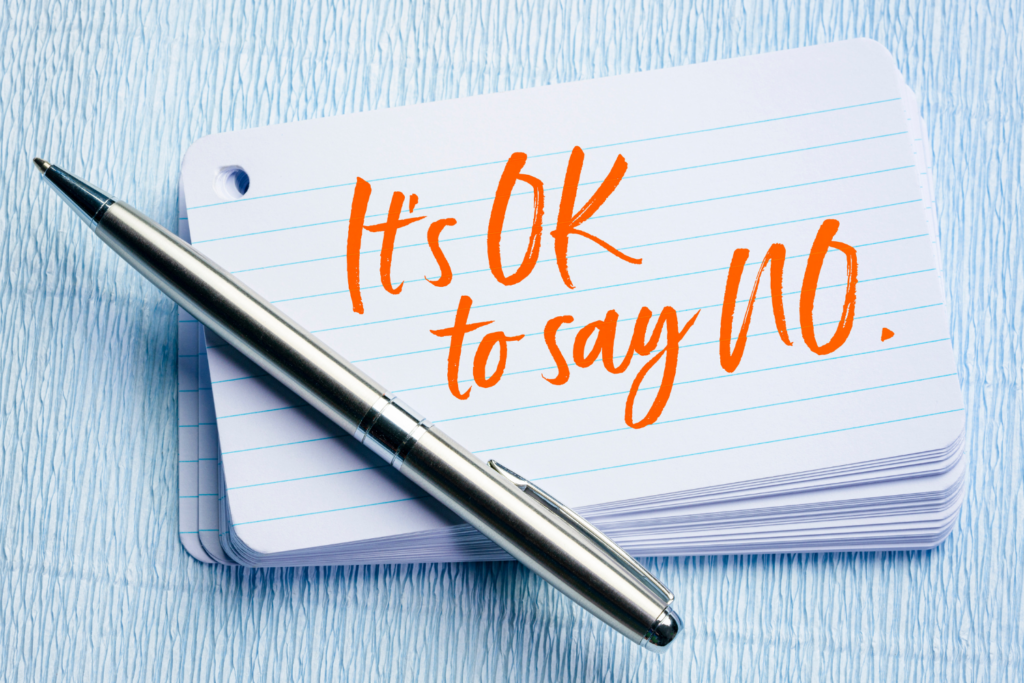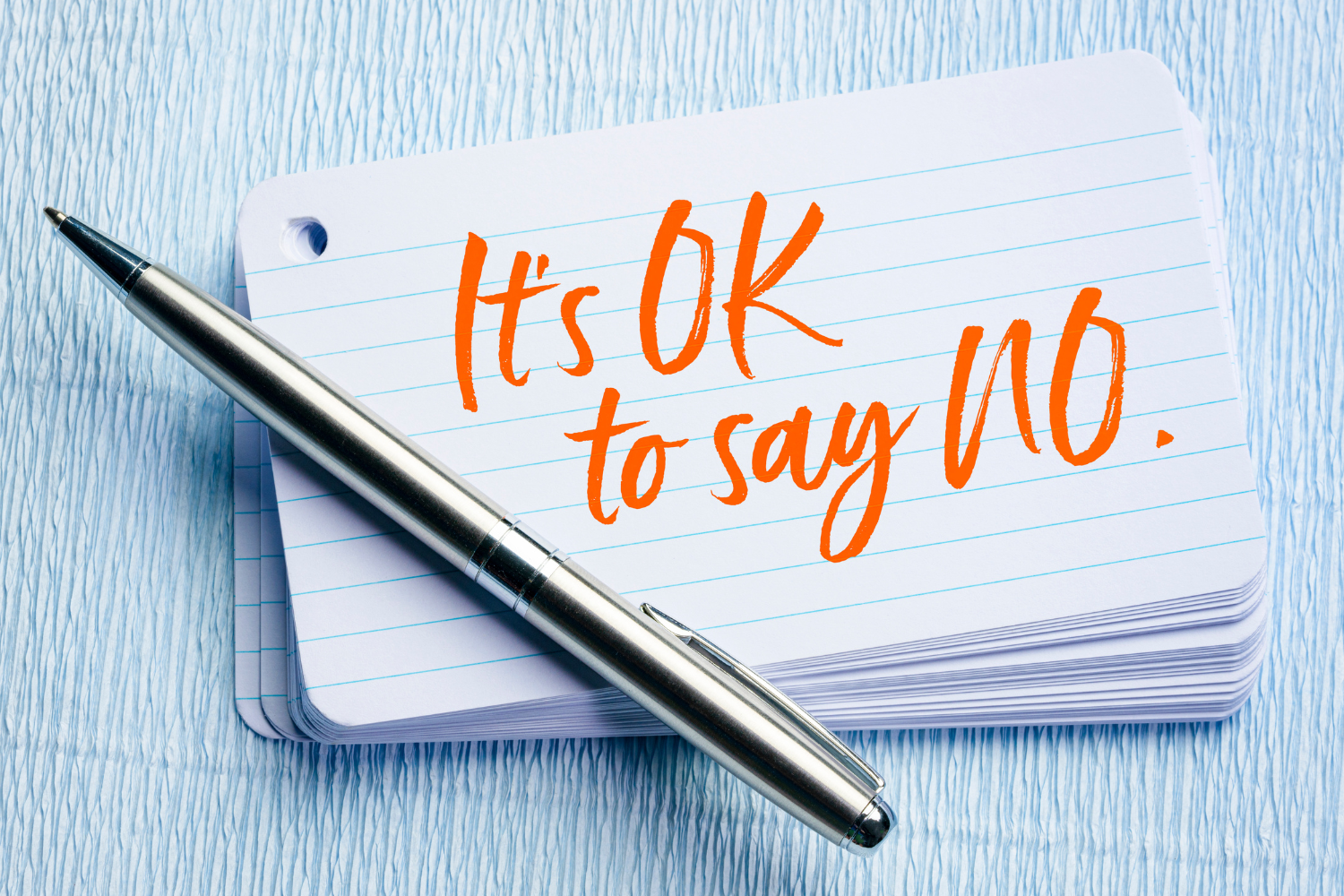If you’re feeling perpetually overwhelmed, undervalued, or just plain exhausted, it might be time to examine the boundaries you’ve set in your life—or perhaps the boundaries you haven’t set. And that’s precisely what I am here to talk about in this blog post!
All of the high-achieving women I’ve coached have found themselves caught in the same vicious cycle: overcommitting to professional and personal obligations, which leads to burnout, leading to even more overcommitment in an attempt to compensate for perceived shortcomings, thereby exacerbating burnout.
I also found myself in this vicious cycle before I embarked on my own personal development journey and I can attest that the cycle can be tough to break.
But trust me when I say setting boundaries is life-changing!
Effective boundary-setting isn’t merely about turning things down; it’s about opening space for a more balanced and rewarding life.
So, in this post, I will explore with you why setting boundaries is essential, how to identify which telltale signs of poor boundaries are plaguing your life, and how you can set healthy boundaries to reclaim your time, energy, and sense of self.
Are you ready to reclaim your time, energy, and life? Good! By the end of this post, you’ll be feeling like a Boundary Boss.

Why Boundaries Are Good For You
Picture this: It’s 7 PM on a Friday, and you’re still at your desk, slogging through just one more email, one more call, one more… something. Or maybe you’re standing at the stove cooking dinner for your family while answering emails.
Sounds familiar, doesn’t it?
For high-achieving women, the day doesn’t end when the clock strikes five—because your drive doesn’t have an off switch.
But it’s likely that it’s not just work that’s draining your energy. Perhaps you find yourself bombarded with requests for help at all hours, from planning family gatherings to last-minute requests with your kids’ homework. Or maybe you’re the first one your friends call when they need a last-minute babysitter or someone to organize events.
It’s easy to fall into the trap of being overly accommodating. You probably do these things without considering your own need for a break or agree to take on just one more project at work, telling yourself it’s just this once—again.
But here’s a not-so-fun fact: Being ‘on’ all the time isn’t just exhausting. It’s unsustainable.
That’s where setting boundaries comes into play. Think of boundaries not as barriers but as your personal VIP list of what matters most in your life. Boundaries help you prioritize. They enable you to place your energy and efforts where they yield the most impact—both professionally and personally.
Imagine having the time to attend your child’s soccer game without fretting about work or dedicating a whole Saturday to your passion project without interruptions. Boundaries make these scenarios not only possible but thoroughly enjoyable!
Suffice it to say, they aren’t just good for you; they’re crucial. By defining what you will and won’t accept in your professional and personal life, you guard your mental energy and prevent the kind of burnout that comes from saying ‘yes’ too often.
But don’t feel bad if you’re lacking boundaries in your life right now. Trust me, setting them is truly an art form, especially for women who have been conditioned to believe that they must excel at all things at all times.
But remember, even superheroes have their limits. Think of boundaries as your invisible cape, helping you fly higher without getting weighed down.
So, let’s chuck the guilt associated with saying ‘no’ into the recycle bin. It’s time to feel good about advocating for your needs.
Now, how can you tell if you’ve fallen into the trap of lacking boundaries in your life?

10 Telltale Signs You've Got A Lack Of Boundaries
Identifying a lack of boundaries in your own life can be tricky, especially when you’re used to operating at full speed.
Here are some clear indicators that you might need to establish firmer boundaries:
#1 - You Can't Remember the Last Time You Had "Me Time"
If your calendar has been filled with back-to-back commitments and the concept of free time sounds like a distant memory, it’s a glaring sign that your boundaries have been overrun.
#2 - You Feel Resentful Towards Commitments
Feeling resentful or dreadful towards upcoming commitments, particularly those that you agreed to out of obligation rather than desire, is a strong indicator that your boundaries need reinforcement.
#3 - You're Always Tired
Constant fatigue is a common symptom of poor boundary management. If you’re constantly feeling drained, it might be because you’re not guarding your energy levels effectively.
#4 - You Feel Like You Have No Control Over Your Schedule
If you often feel that your schedule is dictated by others’ demands or that you’re always in reactive mode, it’s time to take a closer look at your boundary settings.
#5 - People Expect You to Always Say Yes
When others assume you will always be available or agree to every request, it’s likely because you’ve set a precedent by not enforcing your boundaries.
#6 - You Often Work Late Hours to Catch Up
Regularly needing to work into the evening to handle your workload, especially when it’s due to earlier disruptions or additional responsibilities you’ve taken on, signals a boundary issue.

#7 - You're Dealing with Physical Symptoms of Stress
Stress can manifest physically, with symptoms like headaches, muscle tension, or stomach issues. If you’re experiencing these regularly, it’s a sign that your lack of boundaries is affecting your health.
#8 - Guilt Over Saying No
If the thought of saying no fills you with guilt, it suggests that you value others’ needs over your own too frequently. This imbalance can take a toll on your mental and emotional health.
#9 - You Frequently Feel Taken Advantage Of
If you often feel that others exploit your generosity or willingness to help, it could be a sign that your boundaries are too weak or unclear. This feeling can arise when you do more than what is fair or expected, leaving you feeling unappreciated and overextended.
#10 - You Struggle to Make Decisions for Yourself
A lack of boundaries might manifest as difficulty in making decisions that prioritize your own preferences and needs. If you find yourself regularly putting others’ opinions and needs before your own to the point where you can’t determine what you actually want, it’s a clear indicator that stronger boundaries are necessary.
If you’ve found yourself nodding along to some of these signs, it’s clear that it’s time for a boundary makeover. However, you might be wondering exactly which of your boundaries are problematic and what it really looks like to have “unhealthy” or poorly set boundaries.
Let’s clear up that haze and identify what weak boundaries might include so you can start making specific, empowering changes.
What Are "Bad" or "Unhealthy" Boundaries?
Unhealthy boundaries can manifest in various forms and severely impact your professional and personal life. Recognizing these can help you understand where changes are needed.
Here are some common examples of poor boundary practices. (Feel free to jot down the ones that resonate with you; this will help you identify areas for improvement and guide your boundary makeover.)
- Sharing personal information inappropriately or too freely in professional settings.
- Difficulty saying no to requests for your time and energy.
- Feeling responsible for others’ emotions or reactions.
- Regularly allowing others to disrespect your time or personal space.
- Fearing the consequences of setting boundaries, like rejection or conflict.
- Consistently overextending yourself to meet others’ needs or expectations.
- Permitting interruptions during your work or personal time without significant reason.
- Inconsistent enforcement of your boundaries depends on the person or situation.
- Remaining silent in situations where your boundaries are crossed.
- Feeling guilty for dedicating time to self-care or personal interests.
- Frequently making sacrifices for others that you later resent.
- Feeling taken advantage of because of your generosity or availability.
- Agreeing to commitments that conflict with your values or priorities.
- Allowing others to make decisions for you regarding your time and commitments.
- Not asking for help when you need it, burdening yourself unnecessarily.
- Prioritizing everyone else’s needs and comfort above your own.
- Overlooking your physical and emotional health due to a lack of personal time.
- Feeling compelled to answer calls, texts, or emails at all hours.
- Neglecting your hobbies, passions, and interests because of other commitments.
- Allowing others to dictate your schedule and activities.
- Feeling like you cannot refuse extra work, even when it’s unreasonable.
- Worrying excessively about pleasing others and maintaining harmony.
- Ignoring your own needs and signals of stress or fatigue.
- Engaging in relationships or activities that drain rather than fulfill you.
- Compromising your core values and principles to avoid conflict.
- Continually justifying poor treatment from others, both in personal and professional contexts.
- Suppressing your true feelings and thoughts to fit into others’ expectations.
- Constantly adjusting your plans to accommodate others without reciprocal flexibility.
- Accepting less than you deserve in negotiations, whether salary or personal commitments.
- Feeling like you don’t have the right to assert your preferences or opinions.
- Repeatedly letting others’ priorities override your essential tasks.
- Failing to protect your personal information from being spread or misused.
- Routinely placing yourself in overcommitting scenarios without strategic or personal benefit.
- Not allowing yourself the downtime needed to recharge and reflect.
- Overly blending personal and professional life without clear limits.
- Feeling the need to rescue or fix problems for others at your own expense.
- Being overly involved in solving others’ issues leads to neglect of your own needs.
- Feeling constant pressure to perform or be available, undermining your sense of autonomy.
As you wrote down the ones that resonated with you, did you recognize any patterns? Writing them down can be the first step toward meaningful change and establishing boundaries that truly support your well-being and professional success.

The Ultimate Guide To Setting Boundaries Without The Guilt
Okay, let’s talk about guilt. Unfortunately, even though setting boundaries is an empowering act of self-respect, it can also come with a large side of guilt, especially for those who are used to placing the needs of others before their own.
Tough love alert: Guilt is a useless emotion that keeps you stuck in the past. It doesn’t serve you, so the easiest thing to do is let it go.
If you’re reading this, you might worry that asserting your limits could make you seem selfish or uncaring. Let’s dispel that myth: setting boundaries is not only healthy but necessary for sustaining your energy, relationships, and overall well-being.
And as counter-intuitive as it might seem, setting boundaries is not only beneficial for you but for the people around you as well. Because when you’re the best version of yourself, everyone around you gets the best version of you too!
Say hello to being a present mom, a superstar employee, a fun and loving wife, and so much more!
In this next section of the blog post, I’m going to walk you through my 5-step process to setting boundaries without that nagging guilt. You’ll learn to recognize which areas of your life are crying out for limits and how to effectively communicate those boundaries, all while maintaining your professional and personal relationships.
Ready to feel more balanced? Let’s begin by identifying the specific areas of your life that need better boundaries.
Step One - Identifying What Areas of Your Life Need Boundaries
Before you can set effective boundaries, you need to understand where they’re most needed.
This involves a reflective look at your current commitments, relationships, and daily interactions. Whether it’s at work, at home, or with friends, pinpointing where you feel most drained will highlight where boundaries are absent.
Reflect on your interactions and ask yourself these questions:
- Where do I feel taken advantage of?
- What commitments am I keeping out of obligation rather than desire?
- In what areas of my life do I feel like I cannot say no?
The answers will guide you toward the aspects of your life that require firmer limits. So, grab a journal and find some quiet time to sit by yourself to reflect on these questions.
Step Two - Creating Your New Boundaries
Creating new boundaries begins with a clear understanding of your limits. Define what is acceptable and what isn’t, and be as specific as possible.
For instance, if work-life balance is a priority, a boundary might be no work emails after 7 PM. Or if you want to be in bed by 9:00 every night, a good boundary might be establishing a quiet time rule after 8:00 PM with your family.
Follow these tips to create effective boundaries:
- Be Specific: Articulate what your boundaries are clearly and specifically. If you need dedicated focus time, specify what times of day are off-limits for calls and meetings to avoid interruptions.
- Prioritize Needs: Identify which areas of your life are non-negotiable and start setting boundaries there. This could be family time, self-care, or professional development.
- Communicate Clearly: Use simple, direct language when defining your boundaries. Avoid ambiguity, as it can lead to misunderstandings.
- Write Them Down: Documenting your boundaries can help clarify them for yourself and others. It also serves as a reminder of your commitments.
Step Three - Enforcing Your New Boundaries
Once your boundaries are set, the next challenge is enforcement. (Aka – getting everyone else on board!)
This part can be tricky and may even take some time. Be patient, but don’t let your boundaries be ignored. (Fear not – I’ve got more tips for this problem coming up.)
In the meantime, here’s how to get started with sharing your new boundaries.
- Be Consistent: Apply your boundaries consistently. Inconsistencies can create expectations that you might not be willing to meet later on.
- Say No Firmly: Practice saying no when requests infringe on your boundaries. Be polite yet firm, and don’t feel compelled to over-explain your reasons.
- Use Reminders: Don’t hesitate to remind people of your boundaries if they forget. A gentle reminder can reinforce your limits without conflict.
- Protect Your Time: Guard your designated times fiercely. If you’ve set aside time for something important, treat it as a fixed appointment.

Step Four - Dealing With People Who Aren't Respecting Your New Boundaries
Unfortunately, not everyone will respect your new boundaries immediately. It’s something I’ve had to deal with multiple times, so I understand how frustrating or hopeless this might seem.
But there is a way to handle these situations. Here are my top tips:
- Reaffirm Your Boundaries: If someone continuously ignores your boundaries, reaffirm them clearly. Restate what you’ve established as if it’s new information.
- Limit Exposure: Reduce interactions with individuals who consistently disregard your boundaries. This might mean fewer direct projects with a demanding colleague or shorter visits with overbearing relatives.
- Seek Support: If you’re struggling to enforce boundaries in professional settings, seek support from a supervisor or HR. In personal settings, supportive friends or a therapist can offer guidance.
Step Five - Staying True To Your Boundaries For The Long Haul
Finally, maintaining boundaries over the long term is crucial for continued self-respect and personal growth.
Here’s how to stay committed:
- Regular Reviews: Reassess your boundaries periodically. Life changes, and so might your needs and limits.
- Celebrate Successes: Recognize when you successfully maintain a boundary. Celebrating these victories can reinforce their importance.
- Adjust as Needed: Be flexible and adjust boundaries as your personal and professional life evolves. What works now might need refinement later.
- Practice Self-Compassion: Understand that maintaining boundaries is a skill that requires practice. Be patient and kind to yourself through the process.

You're On Your Way!
Congratulations! You’re on your way to becoming a Boundary Boss—and that’s a title worth embracing.
Remember, setting boundaries is less about building walls and more about opening doors: doors to peace, balance, and joy in your life. So, if you’re feeling guilty about putting yourself first, consider this: you’re not depriving others by setting boundaries; you’re giving yourself the permission to thrive.
While you might ruffle a few feathers as you start enforcing your new limits, that’s okay. It’s all part of the process. People who are used to the old, ‘yes to everything’ you will need time to adjust to the new, ‘yes to what matters’ you. Keep in mind, though, that any initial discomfort will pave the way for healthier relationships built on mutual respect and understanding.
Think of boundary-setting as your personal renovation project. At first, it might involve some heavy lifting, and dust could fly everywhere. But once you’re done, you’ll be left with a space that’s functional, beautiful, and uniquely yours. So, grab your metaphorical hammer and start knocking down the walls of chronic overcommitment.
And through it all, keep a smile on your face and a firm resolve in your heart. After all, the person most deserving of your kindness, care, and consideration is—you guessed it—you! Here’s to setting boundaries, losing the guilt, and loving your life more than ever.
Cheers to you, Boundary Boss!
